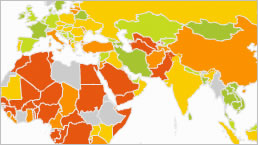A version of this press release first appeared at www.BIS.org(link is external)
26th October 2018
The BIS's Financial Stability Institute (FSI) and the G20's Global Partnership for Financial Inclusion (GPFI) convened the fourth biennial conference on global standard-setting bodies (SSBs) and innovative financial inclusion on 25-26 October 2018 in Basel, Switzerland.
The conference came on the heels of the launching at the International Monetary Fund and World Bank Annual Meetings of the Bali Fintech Agenda(link is external) - a 12-element blueprint for harnessing fintech's opportunities, including for financial inclusion and financial sector development, while mitigating emerging risks to vulnerable retail customers and to the integrity and stability of the global financial system.
Around 90 invited thought leaders attended the conference, representing global SSBs, national financial sector authorities, international organisations and private sector institutions on the frontlines of what the Bali Fintech Agenda refers to as "the fintech revolution".
The conference took place in the context of accelerating change in the financial services landscape in countries across the income spectrum, including expanding opportunities for financial inclusion, but also new challenges for country-level authorities and for SSBs.
Following a video offering reflections by Governor Nestor A Espenilla Jr of Bangko Sentral ng Pilipinas on the dramatic changes brought about by fintech since the first biennial FSI-GPFI conference in 2012, participants discussed the implications of these changes for financial regulation and supervision and the work of the SSBs. Participants explored specific examples of adapting regulatory, supervisory and safety net practices to take into account fintech developments; ways for financial sector authorities to leverage the same technologies driving fintech to support their own work; and the application of the concept of proportionality in the implementation and assessment of international standards.
Conference discussions also addressed pertinent topics such as the use and protection of consumer data, key to the digitisation focus of financial inclusion priorities under the Argentine G20 presidency.
A primary objective of the conference was to foster coordination and collaboration among SSBs on issues of cross-cutting relevance to financial inclusion. In this context, the conference explored lessons learnt from the ongoing coordinated action among SSBs on de-risking as well as the new collaboration imperatives that accompany possible fintech breakthroughs of financial inclusion relevance.
The conference culminated in a session where senior representatives from SSBs and participants examined the implications of innovative financial inclusion for global standards and guidance, building on the previous discussions. This final session brought forward the key topics on which further coordination, collaboration and information-sharing might be beneficial.
Conference Presentations
"Fintech for inclusion" takes centre stage amid accelerating change(link is external), by Pia Roman
Conference Presentations
"Fintech for inclusion" takes centre stage amid accelerating change(link is external), by Pia Roman


